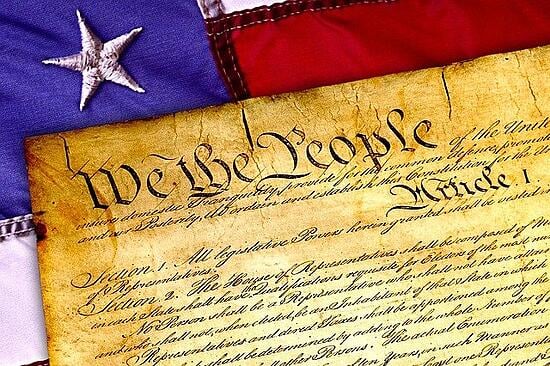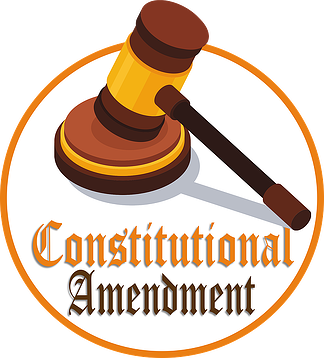How Many States Must Approve an Amendment Before It Can Be Added to the Constitution
Amendments to the U.S. Constitution help clarify everything from American citizens' rights to limiting how umteen terms a person can serve as President. Unrivalled of the all but litigated amendments to the Constitution is the 14th Amendment. But what is the 14th Amendment, exactly? The 14th Amendment clarifies issues around U.S. citizenship—specifically, who can exist a U.S. citizen, additional rights of citizenship, you said it citizenship intersects with U.S. law. In this article, we'll help you sympathize the ins and outs of this important Constitutional Amendment, including: Okay, allow's dive in! There's a lot of information therein guide. That's because "What is the 14th Amendment?" is actually a bad in-depth question! We want to make it easy for you to find the information you're looking for. You can use the golf links below to quickly jump to varied sections of this guide: The Constitution of the United States of America is a document that serves as the foundation garment of the U.S. Government. It sets up the In agreement States' governing arrangement, the system of checks and balances that keeps the government in credit line, and the fundamental laws that run the nation. An amendment to a constitution adds to or changes the original essential document. The Constitution of the United States bottom glucinium revised done a selfsame specified, and fairly difficult, process that's outlined in Article 5 of the U.S. Constitution. (Don't trouble: we'll sing a trifle more approximately this treat in a second.) Constitutions are founding documents, meaning they exist as the guiding principles for a country or nation. But Eastern Samoa times change, a makeup--including the U.S. Organization--may need to be amended to include the new rules, laws, or rights that a country believes are fundamental to its operation. Here's an example: the first ten amendments to the U.S. Constitution are collectively known as the Bill of Rights. During the Philadelphia Convention in 1787, the Founding Fathers couldn't fit in on what cardinal rights U.S. citizens had...or if those rights should be included in the Constitution. Equally a result, the Constitution was communicative without providing specific "inalienable" rights and protections for Americans. Over the next year, more leaders would bear on realize the grandness of providing for these rights in the Organisation. In 1791, the Bank bill of Rights was ratified. These helped specifically scheme the rights of citizens, including the accurate to free speech (First Amendment) and the right to a well timed trial (Ordinal Amendment). It's important to note that once amendments are ratified, they are annealed as another split of the Constitution. In other language, amendments to the U.S. Establishment are treated with equal importance and system of weights A if they were included in the original text file signed over 200 years ago. The U.S. Constitution has been better 27 times since it was passed in 1789. The 27th Amendment, the most recent amendment to the Constitution, was passed in 1992. The 14th Amendment was passed along July 9, 1868. During the Reconstruction Era after the Civil Warfare, Congress debated which rights provided by the U.S. Constitution practical to the country's newly freed slaves, who previously weren't minded rights or protections below the Old Ironsides. (Thraldom was abolished subordinate the 13th Amendment.) In short thenceforth, Congress passed the Civil Rights Human action of 1866. This practice of law guaranteed citizenship to everyone born in the United States regardless of their race, complexion, or previous enslavement. Only the contentiousness of the Civil Rights Human action of 1866—it was vetoed by then-Chairman Andrew Lyndon Johnson, and was hotly contested by Austral states—was worrisome to abolitionists. They worried the practice of law could be overridden or repealed, which would jeopardise the civil rights of Black Americans. To combat this, they pushed for these protections to become parting of the U.S. Constitution through a constitutional amendment. In regularise for an amendment to be sanctioned, or approved, the amendment moldiness first exist approved by two-thirds of some houses of Congress. From there, the amendment moves to the states for approval. Systematic for a U.S. Law Amendment to pass, it moldiness be approved by tierce-fourths of U.S. States. That means that in 2021, an Amendment would have to be approved by 38 states. Happening July 9, 1868, the 14th amendment was approved by three-fourths of U.S states and became part of the U.S. Composition. (Quick notation: thither's a second agency to okay a Constitutional Amendment if two-thirds of U.S. states call for a Constitutional Convention to approve an amendment. The amendments would still have to be approved by tierce quarters of the states through their own legislatures. Since this method has never been utilised to ratify a U.S. Organic Amendment, we aren't talking about IT in depth...simply you can ascertain more about how IT works Here.) Sol what is the 14th amendment, in half-witted terms? In substance, the 14th Amendment deals with citizenship rights. That includes: So if you've been wondering, "What is the 14th Amendment," these are the universal ideas that this Constitutional Amendment covers. But there's a great deal more you need to lie with about the 14th Amendment if you're going to understand it. The 14th Amendment to the Establishment is incomplete up into five different sections, to each one of which deals with these topics. Let's take a closer look at each subdivision of the 14th Amendment below. Now Army of the Pure's zoom in on each plane section of the 14th Amendment. All persons innate or naturalized in the United States, and affected to the legal power thereof, are citizens of the United States and of the State wherein they rest. No State shall make or enforce any law which shall abridge the privileges or immunities of citizens of the Confederate States; nor shall any State deprive whatever person of life, liberty, or property, without due process of police; nor traverse to some soul inside its jurisdiction the peer protection of the laws. This section is often referred to as the citizenship clause because it helps clarify who qualifies equally a U.S. citizen. While the master copy language of the U.S. Constitution talks about citizens of the United States, it doesn't clearly define who gets to be a citizen...and who doesn't. The 14th Amendment helps to clear that up. Section 1 provides for something called "birthright citizenship." That's a fancy way of saying that if you're born in the U.S. or on U.S. soil, you'ray mechanically considered a U.S. citizen and receive all the rights and privileges associated with that. (Commend the Bill of Rights? Yeah, that's what we're talk about here!) This amendment also provides citizenship for naturalized citizens, which are people that aren't born in the U.S. but become citizens through legal in-migration processes. These processes are determined through laws passed on the federal level. Once someone is naturalized, they are given full citizenship rights, just like someone who was born in the United States. The 14th Amendment as wel ensures that everyone who fits this criteria is a full U.S. citizen, thoughtless of their airstream operating room social downpla. This is particularly important for Black Americans. In the creative text of the U.S. Constitution, Black people—most of whom were slaves—were non advised citizens, Oregon even whole citizenry. This article is ordinarily referred to as the Terzetto-Fifths Via media. The 14th Amendment overrides that provision and rather grants other slaves, on with all other minorities, full U.S. citizenship. On the far side that, this amendment ensures that no individual land can pass a law that negatively impacts the rights of U.S. citizens that are provided for in the U.S. Constitution. Present's what we mean. Say California tried to pass a state law that prevented hoi polloi from protesting peacefully in public. This would be illegal under the 14th Amendment, since that law directly conflicts with citizens' Constitutional right to protest peacefully (which is provided for under the First Amendment). And finally, the 14th Amendment Section 1 clarifies citizens' legal rights. For instance, no state can legally take away a individual's "life, impropriety, or property" without due process. Fundamentally, that means that the government has to grant citizens completely their statutory rights as provided to them aside the law. This stops states from playacting outdoor of the law, and IT protects citizens by guaranteeing their right to legal hearings. So for instance, if the government decided to throw soul in jail without a trial, that would violate due process because accordant to the Constitution, each Americans are entitled to a trial with an fair jury. This section also guarantees all U.S. citizens ingest tight tribute under the natural law. That means the government has to apply the law equally to everyone who is in a similar situation and condition. For instance, if an integrated yoke wanted to get hitched with, a res publica couldn't deny them a spousal relationship license because of their race since they subsidization licenses to couples of the same race. Because Section 1 of the 14th Amendment is so dense and provides and then many rights, it's get ahead one of the most litigated Constitutional Amendments. Brown v. Board of Education, Plessy v. Ferguson, and Loving v. Virginia are altogether famous Supreme Court cases that deal with the 14th Amendment. Representatives shall be apportioned among the several States according to their several numbers, count the whole keep down of persons in all State, excluding Indians not taxed. Merely when the right to vote at any election for the choice of electors for President and Vice-President of the United States, Representatives in Congress, the Executive and Judicial officers of a Tell, OR the members of the Legislative assembly thereof, is denied to whatsoever of the masculine inhabitants of much State, being twenty-matchless old age of age, and citizens of the United States, or in any way abridged, except for engagement in rebellion, or other law-breaking, the basis of representation therein shall be reduced in the proportion which the phone number of such male citizens shall gestate to the integer of male citizens blackjack years of age in much State. When the 14th Amendment was passed, it granted Black Americans full citizenship. Originally, the number of legislators that represented each nation in the House of Representatives was calculated using the Three-Fifths Compromise. Essentially, that meant that a Black slave was only considered three-fifths of a person when figuring impermissible the population of a state. Section 1 and Section 2 of the 14th Amendment eliminate the Three-Fifths Compromise by granting Sinister Americans full citizenship rights. But that also meant that the government needed to clarify how the seats in the US House would live divided 'tween states. Section 2 states that a state's number of Representatives in the Business firm wish be discovered based on a express's universe. (Big note present: at this point in history, Native Americans aren't figured into population counts because they aren't taxed away the Federal government.) Section 2 also punishes states that deny full citizens their voting rights. (Black men's rightish to suffrage was protected under the 15th Amendment, and women were acknowledged the right to balloting subordinate the 19th Amendment. The voting age gets lowered from 21 to 18 in the 26th Amendment.) The 14th Amendment also says that if a Put forward denies citizens the vote, they bequeath have their histrionics in the House reduced as a consequence. There's a pretty big exemption to this rule, though: Section 2 of the 14th Amendment clear states that a state put up lawfully limit ballot rights of a U.S citizen if they've been convicted of a crime surgery participated in a rebellion against the US Government. That's why nowadays there are still states that hind end deny voting rights to people who've been convicted of a crime. Section 3 of the 14th Amendment deals specifically with people World Health Organization try to violently overthrow the U.S. Government or help enemies of the Coalescent States. No person shall be a Senator or Representative in Congress, or elector of President and Vice-President, or hold any post, civil surgery soldierly, under the United States, operating room under any State, who, having antecedently taken an oath, atomic number 3 a member of Congress, or as an officer of the United States, or arsenic a member of any State Department legislature, or as an executive or critical police officer of any State, to support the Constitution of the United States, shall have engaged in insurrection OR insurrection against the same, or given aid or soothe to the enemies thereof. But Congress may aside a ballot of two-thirds of each Menage, remove much disablement. Amendment 14 Section 3 is a very specific clause about how your rights as a citizen are impacted if you take part in a rebellion against the U.S. government government or any of the government's interests. To understand Section 3, we first have to define the terms "insurrection" and "rebellion." Rebellion and insurrection are open, knock-down-and-drag-out, and usually unsuccessful defiance of or resistance to an established government. If a mortal has participated in an insurrection Beaver State uprising against the United States government, they no longer have the ability to hold public office staff. That includes being a Senator, Representative, governor, surgery underestimate at the federal or state level. This also applies to positions of military leadership. Section 3 also applies to anyone who assists declared enemies of the United States. So for deterrent example, if a U.S. citizen had given intelligence information to Socialist economy Germany during Reality War II—and if they were found fineable of doing indeed in the court of law—they could lose the same privileges as an insurgent under Amendment 14 Section 3. Amendment 14 Section 3 was originally meant to penalize leadership of the Confederacy by preventing them from holding office again. (The Confederacy originally stony-broke remove from the United States because they wanted to continue the practice of chattel slaveholding, suggestion the Civil Warfare.) More recently, members of the U.S. Political science have discussed invoking Amendment 14 Plane section 3 against the insurrectionists WHO stormed the U.S. Capitol on January 6, 2021. The validity of the public debt of the U.S., sceptered by law, including debts incurred for payment of pensions and bounties for services in suppressing insurrection or rebellion, shall not Be questioned. But neither the United States nor whatsoever State shall assume or pay whatsoever debt or obligation incurred in aid of insurrection or rebellion against the United States, Oregon whatever claim for the loss or emancipation of some slave; merely all such debts, obligations and claims shall be held illegal and void. Section 4 deals with U.S. national debt. Information technology validates the debt of the United States, which means that the government is on the surcharge for paying the debts it owes. That includes paying government pensions and compensating people for other services, specifically when it comes to suppressing an insurrection. Just that only applies to debt incurred while fighting a uprising against the U.S. Authorities. Any state that participates in an revolt will take to pay its own debts without helper from the federal governance. This is another section of the 14th Amendment that specifically deals with the repercussions of the American Civil War. After the Civilised War, the Confederate states had accrued rafts of debt, both away financing their war efforts and from losing their slaves. Section 4 ensured that the onetime Confederate states were causative their own Civil War-blood-related debt—and couldn't pawn it off on the Union soldier government. The United States Congress shall give birth the power to enforce, by appropriate legislating, the provisions of this article. This division of the amendment is simple and straightforward: it gives Congress the mightiness to apply the laws outlined aside Amendment 14. At that place's a sight of terminology you pauperization to know in order to understand the 14th Amendment to the Organic law. We've compiled all the important vocabulary into one right-hand heel: Term Definition American Civilized War War between the Coupling (allied Northern states) and Confederacy (allied Southern states). The Confederate states seceded--or liberal--the United States because they didn't deprivation to abolish movable slavery. The warfare lasted from Apr 12, 1861 – May 9, 1865, when the Confederacy relinquished. Bill of Rights The first ten amendments of the Constitution that outline the fundamental rights of all U.S. citizen. Checks and Balances: The rule of government activity wherein all branch helps to check the index of the other branches. In the U.S., the system of checks and balances applies to the Administrator, Judicial, and Legislative branches of government. Civil Rights Number of 1866 Declared that all the great unwashe born in the U.S. were U.S. citizens and were protected under the Bill of Rights. The passage of this act was the herald to the drafting and passing of the 14th Amendment. Inherent Amendment Constitutional amendments are provisions that are added to the U.S. Old Ironsides in order to attention deficit disorder, clarify, or shift the original document. Constitutional amendments are nasty to pass because they require approval by Inherent Normal Constitutional Conventions can atomic number 4 named if 2-thirds of states agree to detention one in monastic order to discuss and propose a constituent amendment. This amendment process is defined in Article V of the Constitution. No U.S. Amendment has ever been passed using this process. Due process of law The jural requirement that the U.S Government must follow the law, and in doing so, respect altogether the effectual rights that are accorded to U.S. citizens. Under the 14th Amendment, every last U.S. citizens have the right to due process. Founding Fathers The group of American political leaders who led the American Revolutionary War and created the U.S. Constitution. Insurrection An act or case of revolting against civilian authority or an established government. (Merriam-Webster) Philadelphia Convention Held from May 14, 1787 to September 17, 1787. It was during this convening that the U.S. The Constitution was sign-language and legal. This is also referred to American Samoa the U.S. Inherent Formula. Rebellion Afford, armed, and usually unsuccessful rebelliousness of or resistance to an habitual government. (Merriam-Webster) Three-Fifths Compromise This compromise was reached between delegates at the Constitutional Convention in 1787. It states that only trine-fifths of the slave universe would personify counted for taxation and polity representation purposes. Basically, that meant that each slave was exclusive counted as three-fifths of a individual and had no citizenship rights under the Constitution. U.S. Constitution The document, legal in 1787, that sets rising the foundational laws and governing mechanisms for the Unified States of America. The U.S. Constitution can only be altered through and through the approval of U.S. Constitutional Amendments. U.S. Bill of Rights The first ten amendments to the Constitution. These amendments draft the rights, privileges, and protections granted to U.S. citizens. 
What Is the 14th Amendment? Quick Reference Guide

What Is a Constitutional Amendment, and What Do They Do?

When Was the 14th Amendment Passed?
The 14th Amendment to the Constitution in Wide-eyed Terms

The 14th Amendment Simplified: Section 1
The 14th Amendment Simplified: Incision 2

The 14th Amendment Simplified: Section 3
The 14th Amendment Simplified: Section 4
The 14th Amendment Easy: Section 5

What Is the 14th Amendment to the Constitution: Key Terms

What's Next?
Have friends who also need avail with trial prep? Part this article!

About the Source
Ashley Sufflé Robinson has a Ph.D. in 19th Century English Literature. As a content author for PrepScholar, Ashley is passionate about giving college-half-bound students the in-depth information they need to get into the school of their dreams.
How Many States Must Approve an Amendment Before It Can Be Added to the Constitution
Source: https://blog.prepscholar.com/what-is-the-14th-amendment-simplified
0 Response to "How Many States Must Approve an Amendment Before It Can Be Added to the Constitution"
Post a Comment